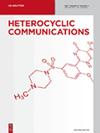Crude extract of J1 fermentation promotes apoptosis of cervical cancer cells
IF 1.5
3区 化学
Q3 CHEMISTRY, ORGANIC
引用次数: 1
Abstract
Abstract Cervical cancer is a typical cancer characterized by abnormal cell growth in the cervical area. Ginkgo biloba L. is a deciduous tree of the genus Ginkgo, possessing anti-cancer effects. The aim of this study was to explore the effect of strain J1 from Ginkgo biloba L. on apoptosis of cervical cancer cells. Bacteriostatic activity test, MTT assay and Flow cytometry were used in this study. Crude extract of J1 fermentation reduced cell growth in cervical cancer. The crude extract of the fermentation broth of strain J1 had a good inhibitory effect on Staphylococcus aureus. The crude extract of the J1 fermentation had no toxic effect on normal WISH cells in the range of anti-cervical cancer concentration. Crude extract of J1 fermentation induced apoptosis and regulated cell cycle in cervical cancer. The active compounds were separated and identified by preparative chromatography, and more than ten compounds were obtained. Our study suggests that the crude extract of J1 fermentation from Endophytic fungi of Ginkgo biloba reduced cell growth, and promoted apoptosis of cervical cancer, and is a potential therapeutic strategy for the treatment of cervical carcinoma.J1发酵粗提物促进宫颈癌细胞凋亡
摘要癌症是一种典型的癌症,其特征是宫颈区细胞生长异常。银杏是银杏属落叶树种,具有抗癌作用。本研究旨在探讨银杏J1株对宫颈癌症细胞凋亡的影响。本研究采用抑菌活性试验、MTT法和流式细胞术。J1发酵粗提物降低了宫颈癌症细胞的生长。菌株J1发酵液粗提物对金黄色葡萄球菌有较好的抑制作用。J1发酵的粗提取物在抗宫颈癌症浓度范围内对正常WISH细胞没有毒性作用。J1发酵粗提物诱导宫颈癌症细胞凋亡并调节细胞周期。通过制备色谱法对活性化合物进行分离鉴定,得到十多个化合物。我们的研究表明,银杏内生真菌J1发酵粗提取物降低了细胞生长,促进了宫颈癌症细胞凋亡,是治疗宫颈癌的潜在治疗策略。
本文章由计算机程序翻译,如有差异,请以英文原文为准。
求助全文
约1分钟内获得全文
求助全文
来源期刊

Heterocyclic Communications
化学-有机化学
CiteScore
3.80
自引率
4.30%
发文量
13
审稿时长
1.4 months
期刊介绍:
Heterocyclic Communications (HC) is a bimonthly, peer-reviewed journal publishing preliminary communications, research articles, and reviews on significant developments in all phases of heterocyclic chemistry, including general synthesis, natural products, computational analysis, considerable biological activity and inorganic ring systems. Clear presentation of experimental and computational data is strongly emphasized. Heterocyclic chemistry is a rapidly growing field. By some estimates original research papers in heterocyclic chemistry have increased to more than 60% of the current organic chemistry literature published. This explosive growth is even greater when considering heterocyclic research published in materials science, physical, biophysical, analytical, bioorganic, pharmaceutical, medicinal and natural products journals. There is a need, therefore, for a journal dedicated explicitly to heterocyclic chemistry and the properties of heterocyclic compounds.
 求助内容:
求助内容: 应助结果提醒方式:
应助结果提醒方式:


